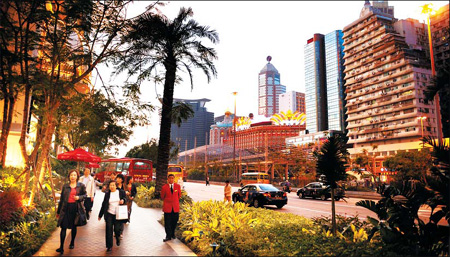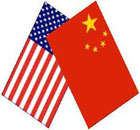Government and Policy
Macao: Residents praise 10 years of security
(China Daily)
Updated: 2009-12-21 09:08
 |
Large Medium Small |
|
 A panoramic view of Macao. The special administrative region has witnessed rapid economic development and improved public security over the past 10 years. [Xinhua] |
MACAO: Ten years after Macao's return to China, taxi driver Jheng Pin-kung is a keen advocate of the new sense of security that characterizes the region.
Jheng, a resident of Macao old town, said: "Ten years ago, we were afraid of going out after 10 pm, but now, we feel safe walking the streets even late at night."
Jheng's endorsement of the new order comes as Macao, a Portuguese colony for around 400 years, gets ready to celebrate the 10th anniversary of its return to China on December 20th.
The Macao Special Administrative Region (SAR), as it is now officially known, was established in 1999 and has witnessed rapid economic development and improved public security over the past ten years.
Prior to the handover, Macao had been synonoumous with gang crime and violent disorder, a situation that terrified both local people and deterred foreign investors.
Following Macao's return to China, a crackdown on crime was the number one priority for the newly-installed SAR government. Within a year of the new administration taking charge, the number of murder cases in Macao fell by 72 percent and incidences of arson were down 40 percent.
Recalling the early days, Cheong Kuoc Va, security secretary of the Macao SAR, said: "Fighting gang crime was our major task. We moved quickly and decisively against organized crime in the region and arrested many of its prime movers. This made an immediate difference to public security throughout the region."
Signs of this increased commitment and efficiency were immediately apparent. In 2001, for instance, the Macao police solved the kidnapping of a senior lawyer within five days, a fact which was widely reported by local and foreign media. Police from the mainland also offered help with the case.
Cheong said: "The new stability of public order in Macao owes much to the SAR government's commitment to this issue and the huge support it has provided in terms of additional manpower, material resources and legal guarantees.
"Substantial support from the central government and close cooperation with the Guangdong police have also been key factors in sustaining this change."
In a bid to crack down on cross-border crimes, the Macao police established links with the Ministry of Public Security and the police authorities in Guangdong, Shanghai and Hong Kong, ensuring that action could be co-ordinated across all the relevant regions.
Chinese authorities started focusing on the public security issue in Macao well before its return. In 1998, the Preparatory Committee of the Macao SAR of the National People's Congress approved a proposal urging the then Macao government to take action regarding public order prior to the handover.
Macao SAR's chief executive, Edmund Ho Hau Wah, has now served in that office for 10 years and has been one of the principal architects of the region's new low-crime regime. He said: "All of the government's resources and policies have been directed toward promoting security and stability in Macao."
Ho admitted that he was disappointed that, over the past three years, the crime rate in Macao had risen, but attributed this to the region's rapidly growing population, an influx of tourists and the effects of the gambling industry. He said, however, that he remained "confident" of Macao's long-term stability.
Hao Zhidong, an associate professor in the Department of Sociology at the University of Macao, share's Ho's optimism, saying: "Public security in Macao has been stable overall."
Earlier this month, the Macao Post Daily reported on a survey conducted by the University of Macao. According to its findings, the paper said, 96 percent of respondents were satisfied with developments in Macao since its return to China.








